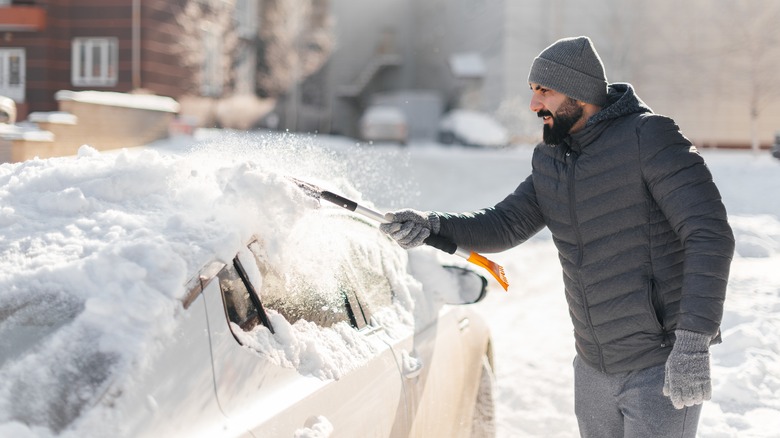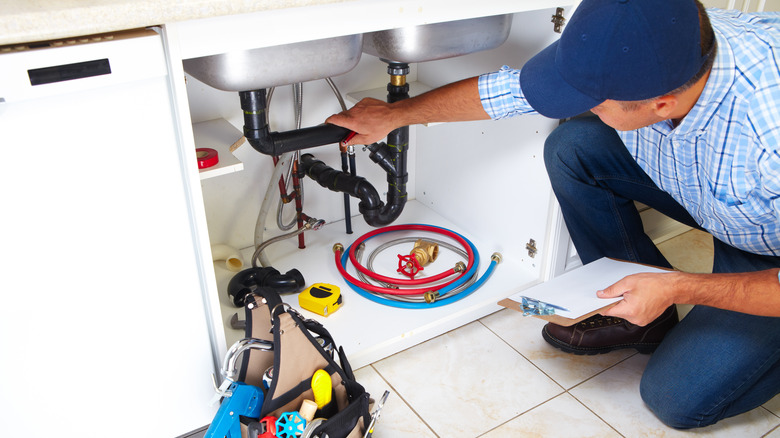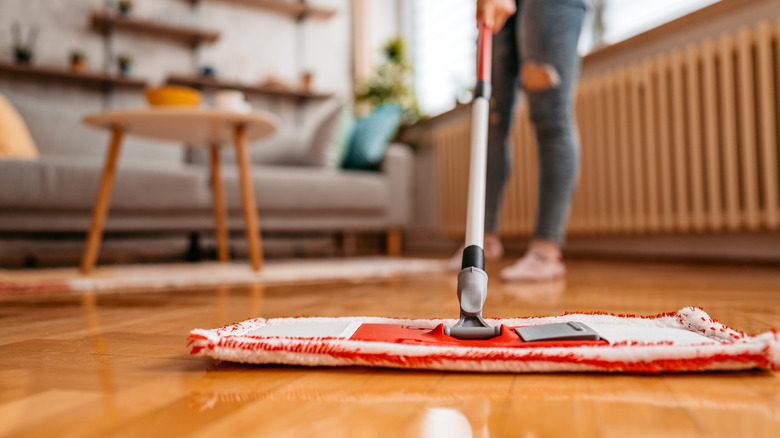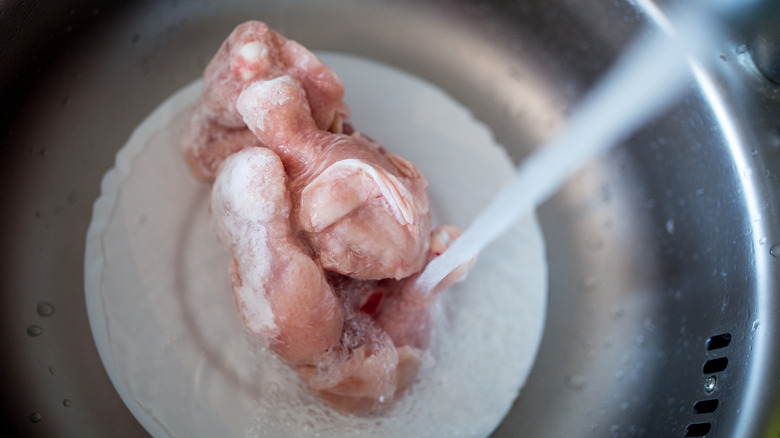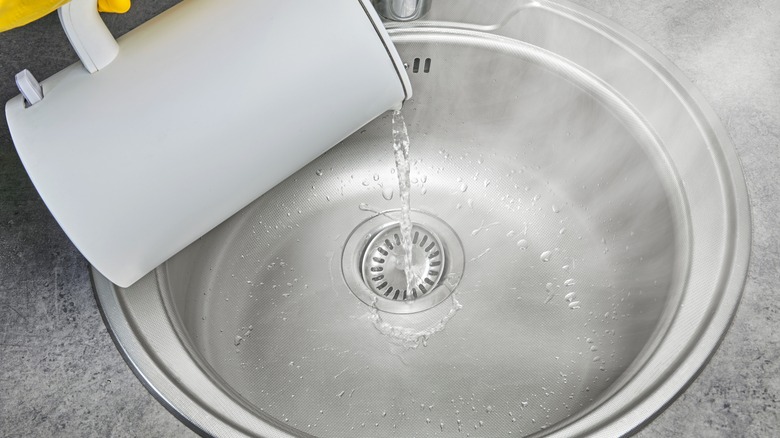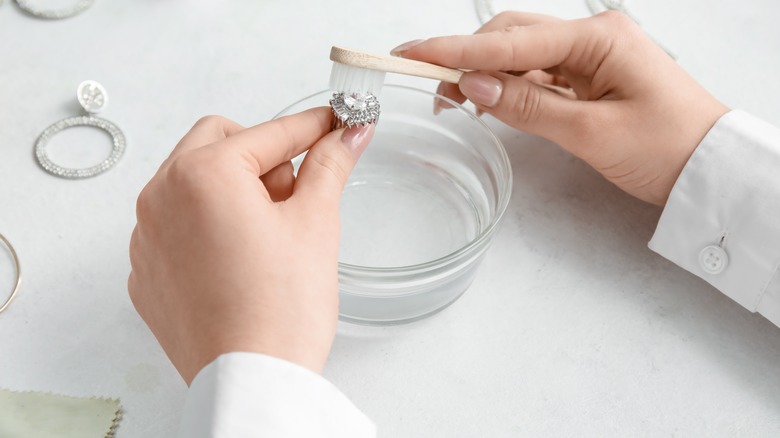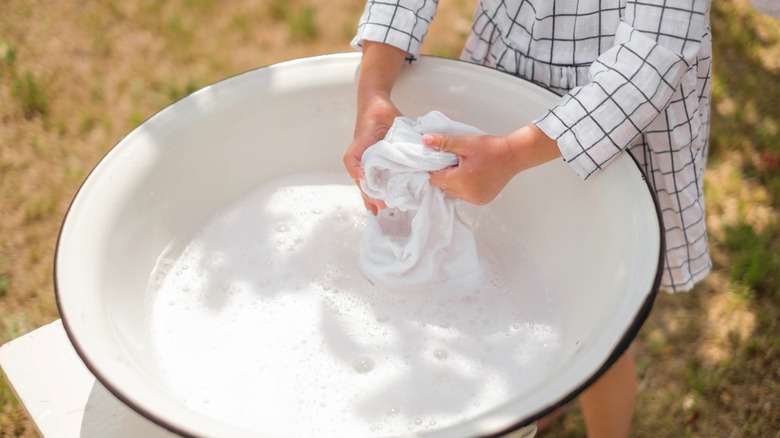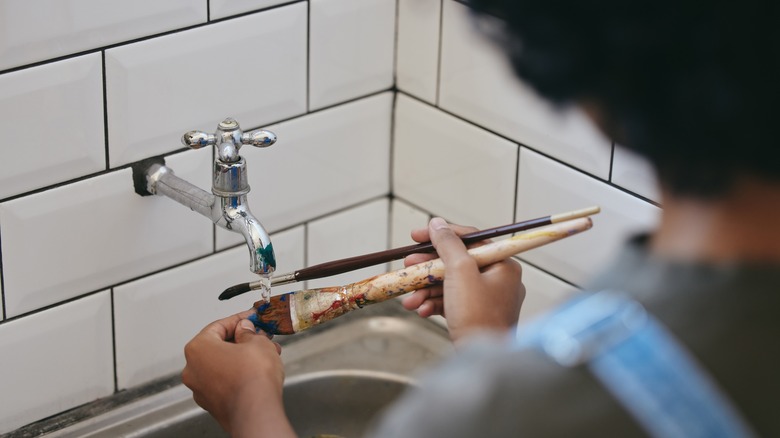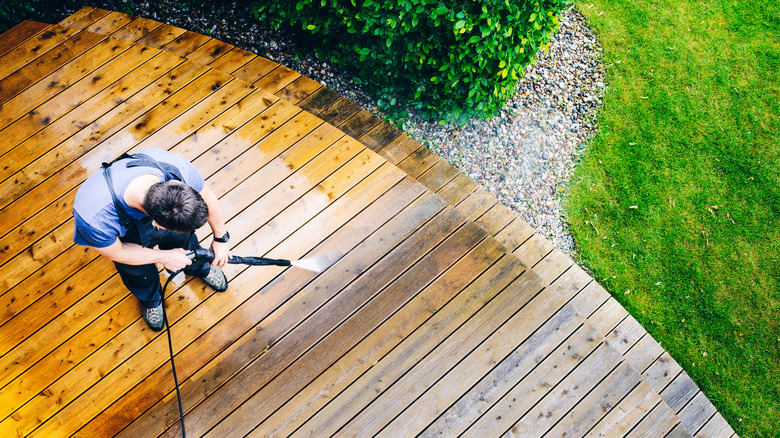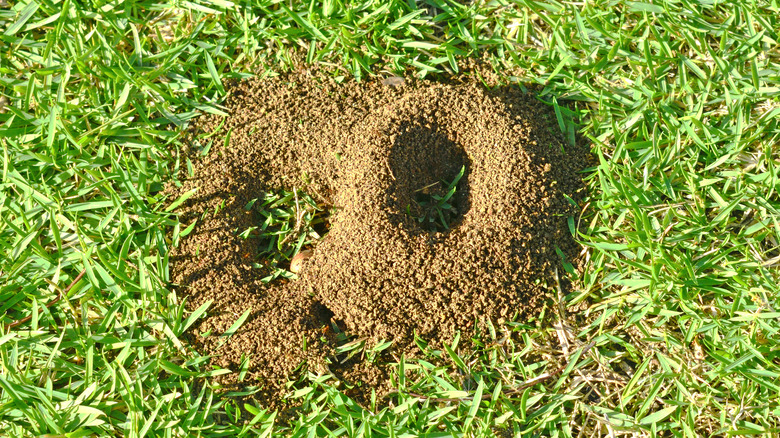Things You Should Never Do With Boiling Water Around Your House
Boiling water is very useful for many projects around the house, from helping you get rid of weeds and pests to ensuring you brew the perfect cup of tea. But, splashing boiling water won't help with all chores, and it can cause damage if you get it on the wrong things. Knowing what to keep the scalding water away from can help safeguard your items and avoid making a bigger mess to clean up.
So, what in situations can boiling water be harmful? If you pour it on your patio or deck thinking that you've found a shortcut to clean it, you may see it damages the finish or wood. Also, pouring boiling water down PVC pipes to get rid of gunk and clogs can cause breakage or melt the joints, resulting in possible leaks.
Knowing what to not use boiling water on helps you clean effectively and keep your house neat without running up an expensive repair bill — or paying to replace whatever you damage. Along with the more understandable spots, there are a few odd places you may never have thought about until you make this mistake and cause damage.
Don't pour boiling water directly onto frozen windshields or locks
Pouring boiling water onto your frozen locks, windshields, or door mechanisms may seem like a good idea. But, in reality, it's an excellent way to damage things. The huge temperature fluctuation the boiling water brings can easily crack or break windshields, as well as bend or break your lock mechanisms. While windshield glass is more durable than most, it doesn't come engineered to survive sudden temperature swings, which cause the outer layer to expand faster than the inner layer, leading to stress points, cracking, or shattering. The fast expansion causes your locks or door mechanisms to deform the metal, making them useless. The water can also seep into crevices and freeze, causing jamming and corrosion that can be expensive to fix or replace.
Instead, use de-icing sprays or lukewarm water to remove ice from your windshields, door mechanisms, or locks. When applied, these sprays lower the water's freezing point, letting you remove the ice without damaging the metal components or glass. If you don't have de-icing spray, gently applying a small amount of lukewarm water melts the ice without thermal shock. Switching the defrost setting on in your car will also gradually warm up your windshield, lowering the chances of damaging the glass. Park in the garage or put magnetic insulation covers over your door locks to stop them from freezing.
Don't use boiling water to unclog plastic pipes
Although it's possible to use natural ingredients to unclog the drain, avoid boiling water if you have plastic pipes. PVC or other types of plastic are common home plumbing system materials because they're cheap and widely available, but they're damage-prone. Boiling water can make the pipes soften, twist, or melt, damaging your pipe's structure and making it more prone to breaks, leaks, and significant water damage. The trouble and cost of fixing your broken or leaking pipes is much greater than the short-term clog reduction boiling water offers, so avoid using it so you don't have more expensive — and extensive — issues.
There are better ways to clean clogs from your plastic pipes; a drain snake or plunger works excellently. These tools break up and remove clogs without damaging the piping. Mixing vinegar and baking soda into the pipes is an effective, but gentle, clog-buster. Put half a cup of baking soda, followed by half a cup of vinegar, down the drain and cover it to keep the reaction in the pipes and loosen the clog. Flush with warm water after an hour to get rid of any residue. This is a cost-effective and eco-friendly way to deal with clogs without risking the plumbing system.
Don't use boiling water to clean hardwood floors
Your wood floors can expand with heat and humidity exposure, compromising your flooring's durability. Hardwood is naturally porous and soaks up water. Using boiling water on wood causes the pores to open more, take in more water, and warp or swell. This distortion makes parts of the floor stick up (cupping), damaging it enough that you'll have to eventually replace it. If the water is too hot, it'll take the protective finish from your floor, making it easier to scratch or stain and show general wear and tear. Your home's value may also drop if you're trying to sell and have damaged hardwood, as it's something potential new owners would have to pay to replace or fix.
Use a damp mop with a hardwood floor-specific cleaner to keep them safe while cleaning them. Sweep or vacuum the floor to remove any loose debris or dust that will stick to the floor when you mop it. Use as little water as possible to take your damp mop and mild wood floor cleaner along your floor. Hearthwood Floors says not to leave any water pooled on the floor for more than a minute because it can damage the wood or finish. Put the cleaner right onto the spot and scrub lightly with a soft cloth for sticky spots or stubborn stains. This method helps clean your hardwood flooring without warping or stripping the finish to keep it shiny and sturdy.
Don't use boiling water to thaw meat or other frozen foods
Use cold water to thaw frozen foods, especially meat. Doing so helps improve finished food quality while lowering the chances of getting a food-borne illness. Using hot water to thaw your food creates a considerable temperature difference between the frozen exterior and interior. Boiling water can start cooking the outer layer of whatever you're thawing while the inside stays cold, leading to uneven cooking. More importantly, the food's surface will be warmer, which creates an environment where bacteria can grow and multiply. E.coli and Salmonella bacteria thrive in these conditions and multiply very quickly. What's worse is cooking the food item may not kill the bacteria, leading to food poisoning.
There are several safe ways to thaw frozen food items. Putting the frozen item into the refrigerator overnight is the best way to defrost it slowly and safely. You can also run it under cold water if you're short on time. The steady water flow and cold temperature allow the food to thaw evenly without letting the surface get warm enough for bacteria growth. To warm foods you cook immediately, defrost them in the microwave. You must then immediately cook the defrosted items because the outer layer can get warm enough for bacteria to live.
Don't pour boiling water down your sink to remove grease buildup
If you put grease down the drain and it blocks the system, do not attempt to unclog it with hot water. You may believe this is a quick solution to remove the oily mess, but it could lead to more issues. Melted grease will slide deep into the pipes, cool, and harden, re-clogging the pipe. It causes the clogs to move to areas that are harder to get to and puts unnecessary pressure on your pipes that could cause leaks or lead you to need expensive repairs. The solidified grease also traps other waste, making the clog worse and could mean you have to take your pipes apart to reach it.
Dish soap is designed to cut through greasy messes, and warm water is the best way to banish grease buildup from the sink and pipes. It comes made to break down grease with surfactants and flush it away so it doesn't re-harden. Mix dish soap with warm water and put it on the grease spots or pour it down your drain to eliminate existing grease. Once it's gone, start putting your cooking oil residue in a disposable container — like an old can or milk box — once it cools, and toss it into the trash when it hardens. This stops grease from building up in your pipes in the first place, helping you avoid clogs.
Don't clean jewelry with boiling water, especially if it contains fragile stones
Avoid using boiling water to clean jewelry or any with precious stones like turquoise, pearls, or opals. The stones and their settings are very fragile, and boiling water can damage them in a way that is impossible to fix. Thermal shock happens when you expose the stones to a fast temperature change, making the jewels change color, crack, or lose clarity. Also, heat weakens or melts the glue that holds the stones in place, letting them get loose or fall out. Even stronger metals and stones can fall victim to damage from hot water, and they'll take on a dull look or change shape. Because of these risks, you want to learn how to keep your jewelry clean without damaging it.
To safely clean your jewelry, use a jewelry-specific cleaner made for whatever metal and stone you have. These cleaners come designed to remove dirt and bring the sparkle back without dulling the stone or metal finish. Use a soft brush, like a soft-bristled toothbrush, to gently scrub the jewelry and apply the cleaner without scratching it. For hard stones and metal, you can get away with using mild dish soap and warm water. Use cold water to rinse the residue and a lint-free, soft cloth to dry it. If you have antique or valuable jewelry, leave the cleaning to the professionals, as they know how to remove the grime while maintaining your piece's integrity and beauty.
Don't use boiling water to wash delicate fabrics or garments
Don't put fragile fabrics or clothing items in boiling water to clean them. Doing so can damage them to the point where you can't wear them, because of shrinking and warping. Silk, wool, and some synthetic fibers are very sensitive to high temperatures because they're soft. When you put wool or silk into hot water, they'll shrink and change their shape, size, and feel. Also, colors may bleed or fade easier in boiling water, which could bleed onto your other clothing.
Instead, washing your delicate clothing in cool water with a mild soap specially made for delicate fabrics is the way to go. Some care instructions may recommend hand washing too, because it lets you carefully handle the fabric, so the fibers keep their shape. Fill your sink or a bucket with cool water and mild soap. Carefully dip the clothing item into the water and use your hands to work the solution into the fibers. Rinse it with cool water until the soap washes out. To dry delicate fabrics without wringing them out, lay them flat on a towel and press out the excess water. For items that can go in the washer, use cold water and the delicate cycle, so it'll agitate the fabrics as little as possible.
Don't use boiling water to clean paintbrushes
You may think the easiest way to clean your paintbrushes is to use boiling water, but this can actually damage them. If the bristles are in hot water for a long time, they may break or fall out. This makes it harder to make even strokes with the brush. Also, it's common to have wooden paint brush handles, and they don't do well in hot water either. The boiling temperatures can damage the brush's structure, and it may soften, bend, and break. The heat might also weaken the glue holding the bristles, causing them to fall out. You'll find yourself going through paint brushes much faster if you clean them this way, and you won't get the result you want when using them.
The best way to clean them is to use a paintbrush-specific cleaner or mineral spirits, especially if you dabble in oil-based paints. These solvents will break down the oil-based paints without damaging the brushes or the handles. To loosen residues, slowly work the solvent into the bristles and clean out most of the paint before dipping them in clean, warm water. Warm water won't have a negative impact on the brush, while being strong enough to get rid of any residue. After washing, gently straightening the bristles and lay the brushes flat to dry to ensure water doesn't damage the handle.
Don't pour boiling water over your deck or patio
Pouring boiling water on your wooden deck or patio can remove the finish that prevents water from seeping into the wood and rotting it. The sudden temperature switch also makes the wood crack or bed, which weakens the deck's structure and turns it into an eyesore. Composite materials are popular for patios or decks because they're low-maintenance and last for years, but boiling water damages them. Exposure to hot water can make the composite materials' bonds weaker, and this lets them bend, twist, and fade. While you may be tempted to use boiling water to get rid of grime quickly, it leads to more trouble in the long run with expensive repairs.
It's a good idea to use a gentle cleaner made for your deck or patio's specific material to clean it without any damage. To remove mildew, mold, or dirt, use a mop or soft-bristled brush to apply the cleaner and gently scrub the surface, being careful not to scratch the finish. For stained spots, you may need to apply more pressure and use more cleaner to lift them from the patio or deck. When you finish cleaning, get your hose and rinse the space to remove any remaining cleaner. Cleaning your outdoor area every few weeks will not only keep it looking neat, but it will also help it last longer, as you can spot damage early and address it before it spreads.
Don't pour boiling water on ant hills or insect nests
Some people recommend pouring boiling water over ant hills in your lawn, but this isn't a good idea. It can be a short-term solution, but it comes with problems. For example, boiling water will kill insects it has contact with, but it usually won't get the queen because she's deeper in the nest. The water can also damage whatever is around the ant hill, and it can kill or cause thermal shock for any plants, grass, or good soil microorganisms it lands on. This can leave you with a patchy or bare-looking lawn that takes weeks to fix, and the ants will most likely come back in the same spot.
Instead of boiling water, use an eco-friendly, targeted pest control method to eliminate ants or bug nests in your yard. There are many things available you can try to get rid of pests without having a negative impact on the lawn, your pets, or good bugs. Some things are more natural and keep ants or insects away without killing them, or there are bait stations you can set up where the workers will carry the poison back to the queen to take out the whole colony. Hiring an exterminator to safely eliminate any pests without damaging the area around the nest is also possible. They have a more comprehensive range of treatments that give you long-term pest control solutions to keep your yard bug-free.

